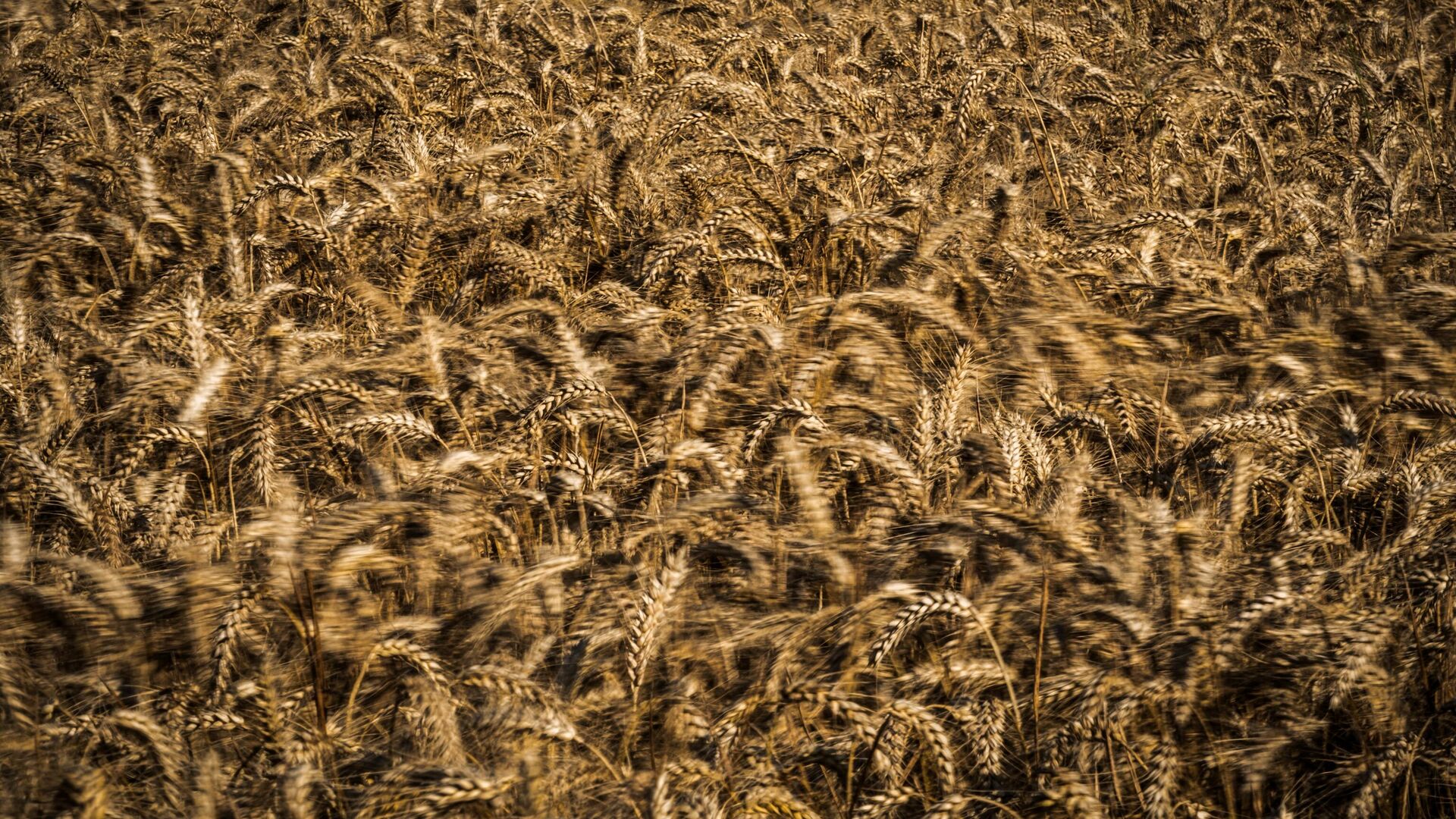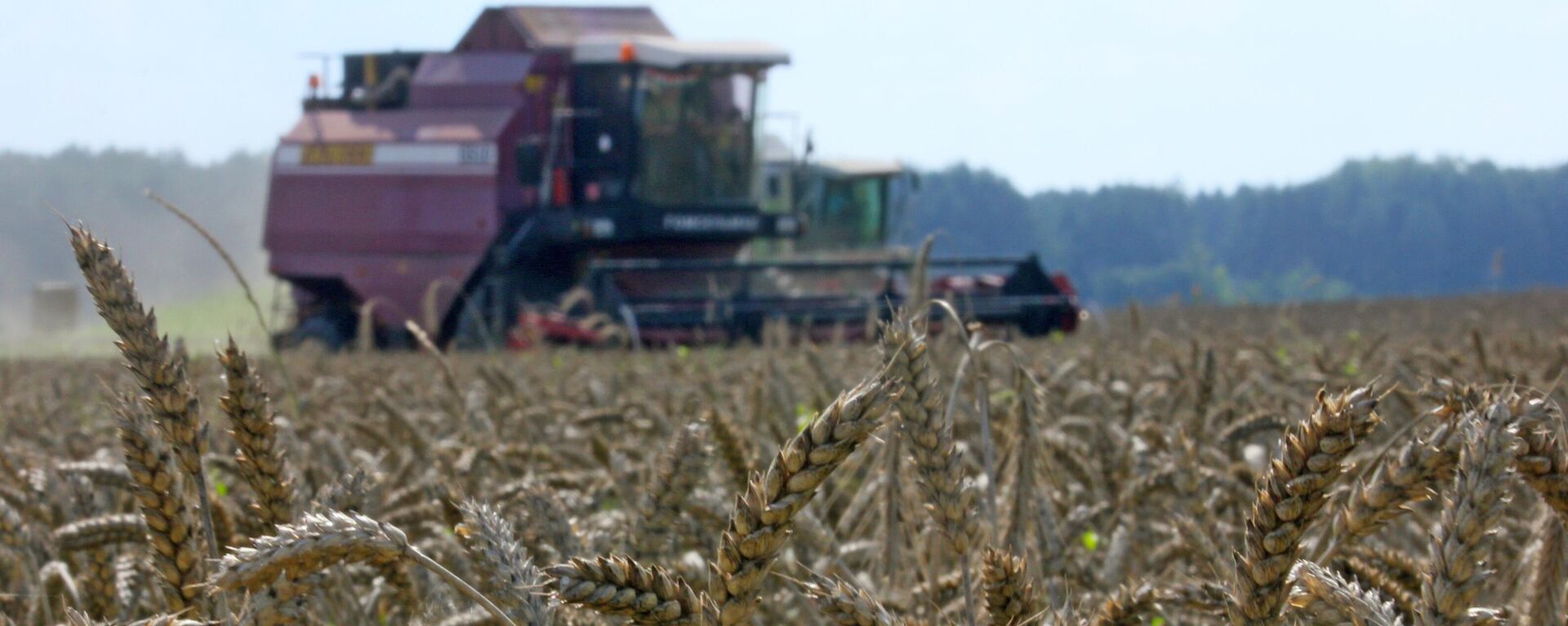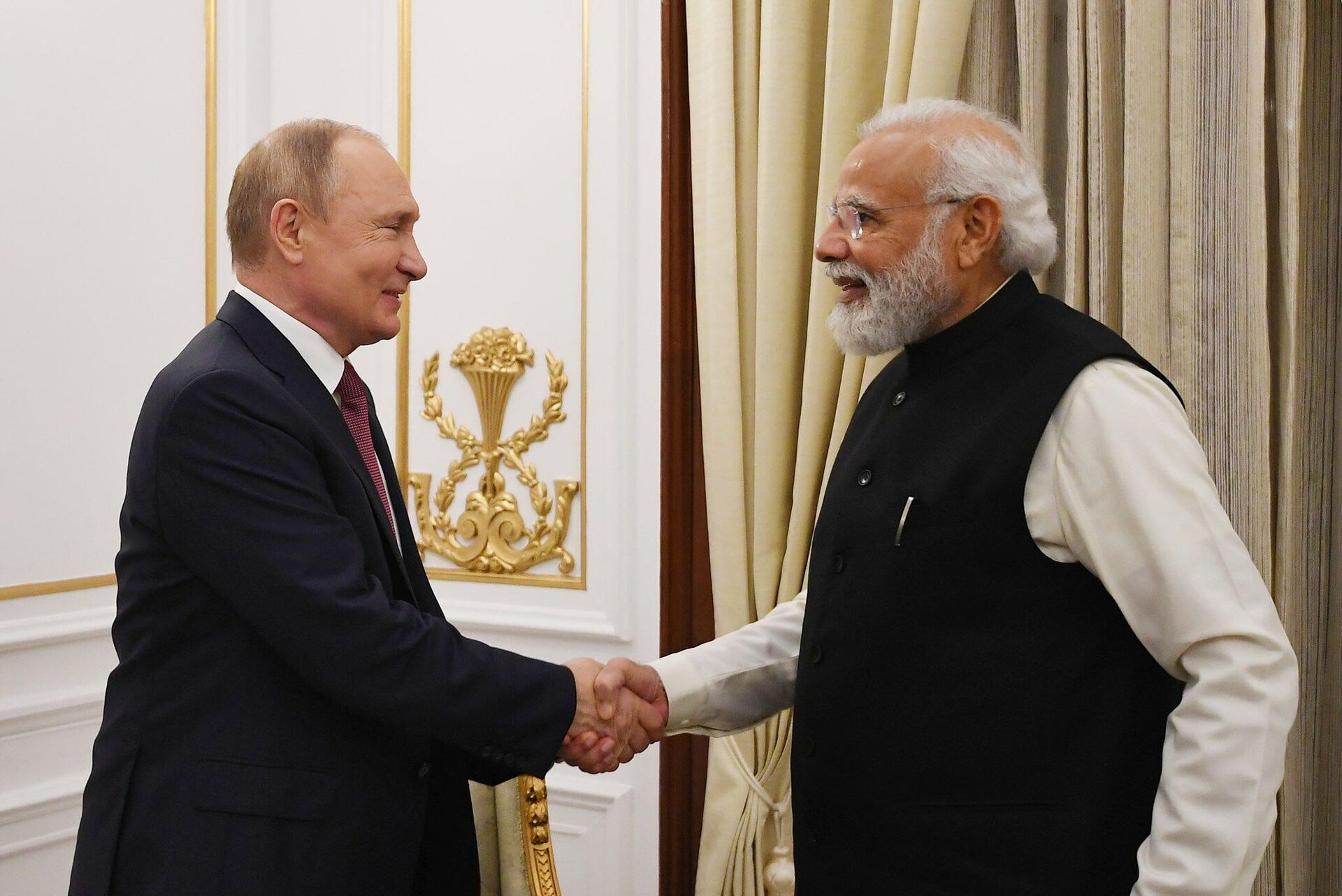https://sputnikglobe.com/20220517/indias-wheat-ban-why-washington--g7-bloc-have-zero-moral-right-to-lecture-new-delhi-1095583054.html
India's Wheat Ban: Why Washington & G7 Bloc Have Zero Moral Right to Lecture New Delhi
India's Wheat Ban: Why Washington & G7 Bloc Have Zero Moral Right to Lecture New Delhi
Sputnik International
The US’ envoy and G7 agricultural ministers have called on India to reconsider its decision to ban wheat exports amid a spike in grain prices and looming... 17.05.2022, Sputnik International
2022-05-17T18:09+0000
2022-05-17T18:09+0000
2022-07-19T10:43+0000
us
europe
world
opinion
wheat
narendra modi
ban
russia
ukraine
sanctions
https://cdn1.img.sputnikglobe.com/img/07e6/05/11/1095584102_0:160:3073:1888_1920x0_80_0_0_7252905832da252777409ab0a6f49a21.jpg
"First of all, the G7 has no reason to express its disappointment over India’s decision to impose an export ban", says Devinder Sharma, a food and agriculture policy analyst. "India is a sovereign nation and it has the right to ensure that it is adequately taking care of the country’s food security. This is immensely important, given the fact that India has an estimated 800 million people who are nutritionally poor and they need to be supported with a food security programme, which is enshrined under the National Food Security Act".India, the second-largest producer of wheat, banned exports of the commodity last week, with Santosh Kumar Sarangi, the director general of foreign trade, signalling that the spike in global food prices threatens India's inner market stability. On Monday, the wheat price soared to 435 euros ($453) per tonne, up from the previous record of 422 euros reached on 13 May, according to Agence France Presse.In response to New Delhi's move, US Ambassador to the UN Linda Thomas-Greenfield stated on 16 May that Washington hoped that India would reconsider its position and urged other grain producers not to restrict exports. Earlier, on 14 May, G7 agriculture ministers said that India's export ban could exacerbate the global food shortage.One should also bear in mind that the ban is not permanent, according to Tandon: in the interim, India can stockpile and try to ensure price stability so that international prices do not feed into domestic prices. Thereafter, when domestic inflationary pressures ease, the ban can be lifted, she explains.Meanwhile, the US and the EU have imposed sanctions on Russia's finances, trade, energy, and transport over the latter's special operation in Ukraine that started on 24 February, disrupting the country's export capabilities. At the same time, the US and NATO have recently increased shipments of lethal weapons to Ukraine, thus prolonging and exacerbating the conflict. Russia and Ukraine jointly account for 30% of the world's wheat exports.'G7 Bloc Continues to Make Biodiesel From Grain'Furthermore, the G7 has no moral right to blame India for the wheat export ban, according to Sharma.Furthermore, according to New Scientist, the US diverts 90 million tonnes of grain to ethanol and the European Union utilises 12 million tonnes, including wheat and maize, notes the food and agriculture policy analyst."Since only 6% of the fuel sold in the US is ethanol, diverting grains back to feed the people wouldn’t make much difference to fuel prices", Sharma stresses. "But it will surely make a lot of difference for the world’s hungry… The Food and Agriculture Organisation (FAO) tells us that 200 million people have slid below the hunger line, and acute food insecurity prevails in 53 countries. This is a time for global leaders to demonstrate statesmanship, and to also lead the world by example".But that is not all: in 2007-2008, the G7 countries failed to "tame" soaring commodity futures and speculation, which affected already increasing food prices when 37 countries faced food riots, Sharma recalls."The failure to do so has once again pushed the food prices to soar, jumping beyond the high price level that the world recorded 15 years back", the scholar says. "If wheat prices have increased by 60% and maize by 54%, as the World Bank Agricultural price Index shows, it is because the world hasn’t learnt any lesson from the food crisis in the past".India Won't Give InThere is little if any chance of New Delhi succumbing to the G7 countries' pressure, according to the Indian observers.Moreover, the Indian government is responsible to its own population in the first place amid the looming food crisis and high inflation, highlights Amit Bhandari, senior fellow for energy, investment and connectivity at Gateway House think tank. The Indian government has repeatedly demonstrated that it puts its national interests first, according to him.Earlier, Western countries tried to persuade New Delhi to reject Russia's oil over Moscow's special operation in Ukraine, Bhandari notes. Nevertheless, India continued to buy Russian crude regardless of the West's pressure. Earlier this month, India yet again defended its continued purchases of Russian oil, stressing that a sudden halt to imports would increase energy prices and hurt its consumers.It is obvious that slapping further sanctions on Russia amid swirling inflation and global supply chains disruption is a path to nowhere, according to the scholar."Russia supplies a massive amount of raw materials", Bhandari emphasises. "You cannot lock such a major supplier out of global markets. It is going to have a very debilitating effect on energy security, food security and economic growth. So frankly, all these restrictions on trade and exports need to be rethought".India is not the only country that has refused to jump on the West's anti-Russia sanctions bandwagon, says Sanjay Pandey.
https://sputnikglobe.com/20220514/bidens-holodomor-policies-to-hurt-ukrainians-americans--backfire-on-whole-world-journo-says-1095507286.html
https://sputnikglobe.com/20220515/india-assures-supplies-to-needy-as-g-7-criticises-modis-wheat-exports-ban-1095523239.html
russia
ukraine
Sputnik International
feedback@sputniknews.com
+74956456601
MIA „Rossiya Segodnya“
2022
News
en_EN
Sputnik International
feedback@sputniknews.com
+74956456601
MIA „Rossiya Segodnya“
Sputnik International
feedback@sputniknews.com
+74956456601
MIA „Rossiya Segodnya“
us, europe, opinion, wheat, narendra modi, ban, russia, ukraine, sanctions
us, europe, opinion, wheat, narendra modi, ban, russia, ukraine, sanctions
India's Wheat Ban: Why Washington & G7 Bloc Have Zero Moral Right to Lecture New Delhi
18:09 GMT 17.05.2022 (Updated: 10:43 GMT 19.07.2022) The US’ envoy and G7 agricultural ministers have called on India to reconsider its decision to ban wheat exports amid a spike in grain prices and looming global food shortage. Indian observers have explained why New Delhi is likely to stick to its wheat policy.
"First of all, the G7 has no reason to express its disappointment over India’s decision to impose an export ban", says Devinder Sharma, a food and agriculture policy analyst. "India is a sovereign nation and it has the right to ensure that it is adequately taking care of the country’s food security. This is immensely important, given the fact that India has an estimated 800 million people who are nutritionally poor and they need to be supported with a food security programme, which is enshrined under the National Food Security Act".
India, the second-largest producer of wheat, banned exports of the commodity last week, with Santosh Kumar Sarangi, the director general of foreign trade, signalling that the spike in global food prices threatens India's inner market stability. On Monday, the wheat price soared to 435 euros ($453) per tonne, up from the previous record of 422 euros reached on 13 May, according to Agence France Presse.
In response to New Delhi's move, US Ambassador to the UN Linda Thomas-Greenfield stated on 16 May that Washington hoped that India would reconsider its position and urged other grain producers not to restrict exports. Earlier, on 14 May, G7 agriculture ministers said that India's export ban could exacerbate the global food shortage.
"Even as the G7 has criticised the Indian government for contributing to the global wheat shortage, it must be understood that India is still a small supplier of wheat", stresses Suranjali Tandon, assistant professor at the Delhi-based National Institute of Public Finance and Policy. "India accounts for 5% of the global exports, the price increases we are observing are the result of many factors, including disruption of supply chains [and a] spike in commodity prices".
One should also bear in mind that
the ban is not permanent, according to Tandon: in the interim, India can stockpile and try to ensure price stability so that international prices do not feed into domestic prices. Thereafter, when domestic inflationary pressures ease, the ban can be lifted, she explains.
Meanwhile, the US and the EU have imposed sanctions on Russia's finances, trade, energy, and transport over the latter's special operation in Ukraine that started on 24 February,
disrupting the country's export capabilities. At the same time, the US and NATO have recently increased shipments of lethal weapons to Ukraine, thus prolonging and exacerbating the conflict. Russia and Ukraine jointly account for 30% of the world's wheat exports.
'G7 Bloc Continues to Make Biodiesel From Grain'
Furthermore, the G7 has no moral right to blame India for the wheat export ban, according to Sharma.
"If the rich countries really care about the poor and hungry people, they should have first set an example by cutting down by at least 50% the grain that is diverted for ethanol and also palm oil that goes into biodiesel production", he emphasises.
Furthermore, according to New Scientist, the US diverts 90 million tonnes of grain to ethanol and the European Union utilises 12 million tonnes, including wheat and maize, notes the food and agriculture policy analyst.
"Since only 6% of the fuel sold in the US is ethanol, diverting grains back to feed the people wouldn’t make much difference to fuel prices", Sharma stresses. "But it will surely make a lot of difference for the world’s hungry… The Food and Agriculture Organisation (FAO) tells us that 200 million people have slid below the hunger line, and acute food insecurity prevails in 53 countries. This is a time for global leaders to demonstrate statesmanship, and to also lead the world by example".
But that is not all: in 2007-2008, the G7 countries failed to "tame" soaring commodity futures and speculation, which affected already increasing food prices when 37 countries faced food riots, Sharma recalls.
"The failure to do so has once again pushed the food prices to soar, jumping beyond the high price level that the world recorded 15 years back", the scholar says. "If wheat prices have increased by 60% and maize by 54%, as the World Bank Agricultural price Index shows, it is because the world hasn’t learnt any lesson from the food crisis in the past".
There is little if any chance of New Delhi succumbing to the G7 countries' pressure, according to the Indian observers.
"I don't think India will give in", says Sanjay Pandey, professor at the School of International Studies at Jawaharlal Nehru University. "India has in the past also maintained an independent foreign policy and balanced relations with different countries, and I don't think that India will give in to any pressure to change its policy. In the past, the US and Europe have criticised Indian policy on many other issues. So this criticism of Indian policies is no surprise".
Moreover, the Indian government is responsible to its own population in the first place amid the looming food crisis and high inflation, highlights Amit Bhandari, senior fellow for energy, investment and connectivity at Gateway House think tank. The Indian government has repeatedly demonstrated that it puts its national interests first, according to him.
Earlier, Western countries tried to persuade New Delhi to reject Russia's oil over Moscow's special operation in Ukraine, Bhandari notes. Nevertheless, India continued to buy Russian crude regardless of the West's pressure. Earlier this month, India yet again defended its continued purchases of Russian oil, stressing that a sudden halt to imports would increase energy prices and hurt its consumers.
It is obvious that slapping further sanctions on Russia amid swirling inflation and global supply chains disruption is a path to nowhere, according to the scholar.
"Russia supplies a massive amount of raw materials", Bhandari emphasises. "You cannot lock such a major supplier out of global markets. It is going to have a very debilitating effect on energy security, food security and economic growth. So frankly, all these restrictions on trade and exports need to be rethought".
India is not the only country that has refused to jump on the West's anti-Russia sanctions bandwagon, says Sanjay Pandey.
"There are countries like China, like Iran, and there are some European countries also who do not always agree with the US understanding of the global situation or conflicts", notes the professor. "I suppose there are countries that do not go along with the US or Europe. And those countries, including India, as sovereign nations, have the right to have their own foreign policy and their own position on various global and regional issues".





